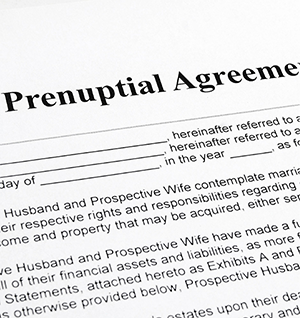Financial Empowerment for Your Business; 5 Precautionary Measures for Business Owners Going Through Divorce

So you own a business- Awesome! Oh, you’re going through divorce that sucks.
When you are a business owner facing divorce, protecting those assets can be really important.
In this post we will briefly discuss precautionary measures that business owners can take to safeguard your business resources:
- Create a clear ownership structure
- Keep personal and business finances separate
- Update your prenuptial or postnuptial agreement
- Seek a professional valuation of your business assets
- Understand different dispute resolution methods
Create a clear ownership structure

Before any divorce settlement that involves a business can happen the ownership of a business needs to be confirmed - ie: all the owners need to be identifiedIf you do nothing else, have organized documents that clearly specify roles of yourself (and potentially your spouse). You can also specify the business cannot be transferred in the event of a divorce and that a cash award may be made to the non-titled spouse- that information is often contained in Operating agreements.
Especially when partners are involved this can be useful in protecting business assets in outlining ownership and transfer restrictions. In addition when you have a buy-sell agreement, include what happens in the event of a divorce.
Keep personal and business finances separate

This should go without saying - but - keep your personal and business expenses separate. It is also important to be aware that mixing business and personal expenses will add complexity and could be affect your settlement to the negative. Another reason (or example): If you are making $200K but running significantly more in personal expenses through your business it is possible that the value of your business would come under scrutiny.
Now that we have that out of the way. . .
Maintain clear records of sources of capital for the business (were they premarital or marital assets used to set up the office space and pay rent, etc). If there is a cash component to your business make sure the cash transactions are well documented.
Be aware of the potential consequences of paying yourself an income that is not consistent with market standards. Let’s say the market rate for your position is $200K but you are paying yourself significantly less. At that your spouse could assert the market rate should be imputed to you for purposes of determining child support and spousal maintenance.
On the same train of thought, if your spouse is working at your business (even in a minor capacity) pay them market rates for their services- your spouse could argue for a higher percentage given their contribution to the firms value
Update your prenuptial or postnuptial agreement

By drafting an agreement you can ease anxiety and facilitate a resolution. In the agreement you can specify a variety of things. For example:
- You can specify that the business is considered separate property and not subject to division
- You can specify that any value added to the business after the marriage date is marital property
- You can limit the non-titled percentage than they would receive in other marital assets (like other marital assets are to be divided equally but the non titled spouse may only receive x% of the business’s value accumulated during the marriage)
- You can specify which spouse will buy out the other in case of divorce. In this spirit you can specify that payment is to be structured or even deferred until the sale of the business if complete or you can specify the grant of options to be exercised in the future
- You can save yourself a lot of time and effort by getting a pre or postnuptial agreement and everyone agrees to the details up front (important detail: postnuptial agreements can only be entered into when not contemplating divorce).
Seek a professional valuation of your business assets
It’s a good idea to have an accurate valuation of your business whether it is asset based, income based or market based. Having a credible valuation report helps to ensure an equitable division of marital assets (including business interests) and can help facilitate negotiations as well as preventing disputes over the value of a business during divorce proceedings. As you start the valuation process here are some important questions you need to be ready to answer

- Were previous valuations completed?
- Were written offers for sale (or letters of intent) to buy the business made to the owners in recent years?
- Do any buy-sale agreements exist that provide an agreed method to calculate the value of the business?
- Who are the partners of the business?
- Are there restrictions on transferring interests in the company per the governance that require other partners to approve transfers between spouses?
- Are there assets in the marital estate that can support an immediate buyout of the interest held by one spouse in the business? Or will there need to be a negotiation in terms of a structured payment for spousal interest?
- What is the level of debt in the business?
The other consideration is how are you determining which valuation report to use- you would think this straight forward, but sometimes it is not.
You can:
- Both you and your spouse can retain a single valuation expert
- Sometimes spouses have opposing goals, and you can hire multiple valuation experts
- Both you and your spouse can agree to authorize an arbitration panel
Also during this process you need to determine the value of the spousal interest in the business.
Understand different dispute resolution methods
Knowledge is power. There are multiple ways to go through divorce. It benefits you to understand what your options are and what the different scenarios entail. If you have read this far, it is a safe assumption that you want to have as much control as possible over your outcome and maintain business continuity.

Here are a few of the ways to get divorced that I run into most often:
- Pro Se- Do it yourself- it is the most cost competitive option, but sometimes you get what you paid for and may need to hire a professional anyway to go back and try to correct something or address something that was missed.
- With Lawyers- Having someone who advocates on your behalf and understands the laws in your area is valuable especially if you are in a situation where you do not trust your spouse or are concerned about the prospect of litigation.
- Mediation- Utilizing a neutral to help facilitate the divorce process is also valuable and can be cost competitive to litigation
- Collaborative- This process involves lawyers and mediators and sometimes other professionals (like mental health professionals) and everyone involved agrees to help for this process and to drop out if it fails and goes to litigation- it emphasizes cooperation and negotiation.

Big breath- that was a lot to go through.
The important points to remember:
- Have your documents clearly in place to identify who the owner(s) are and to protect your business by naming what if in the event of a divorce.
- By having your business and personal expenses separated you are creating a less complex scenario and helping to maintain that separation in the event of a divorce.
- Having an up to date prenuptial or postnuptial agreement can also be instrumental in facilitating the division of a marital estate that is less contentious.
- Seeking a valuation report for your business is also useful for an equitable division of assets in the event of divorce.
- Do your research and fully understand the options available to you in order to get divorced so that you have as much control as possible towards business continuity.
Remember, divorce is really difficult- get support of a team including a Certified Divorce Financial Analyst to walk through the financial side of this transition with you.
Brianna Beski is a financial advisor and CDFA at Raymond James, based in Colorado. She and her team focuses on helping people navigate transitions in life and help give them confidence in their financial futures. For the rest of the story, please visit her website or email her at brianna.beski@raymondjames.com.
While we are familiar with the tax provisions of the issues presented herein, as Financial Advisors of RJA, we do not render advice on tax or legal matters. You should discuss tax or legal matters with the appropriate professional.
The foregoing information has been obtained from sources considered to be reliable, but we do not guarantee that it is accurate or complete, it is not a statement of all available data necessary for making an investment decision, and it does not constitute a recommendation. Any opinions are those of Brianna Beski of Raymond James Branch 3BA and not necessarily those of Raymond James or Raymond James Financial Services.
Raymond James & Associates, Inc., member New York Stock Exchange/SIPC


